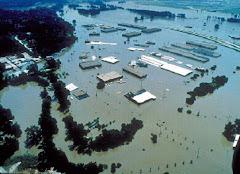Effects of Global Warming on Health
A report of the effects of global warming on health published by WHO, has estimated around one million fifty thousand deaths every year due to global warming. Further it declared that each year five million people are suffering from health problems and diseases caused for this climate change. The rising concern over this matter has led many scientists and researchers to take a deeper look and prepare a plan to save human civilization from this onslaught.
Global warming has caused changes in temperature, ocean current flow, sea level, ecosystem, economy, agriculture, industry, settlements and related to all these - the health and living.
Warmer world has created congenial atmosphere for the breeding and life expanse of various virus, bacteria and carriers of infectious diseases. Few evidences of global warming leaving negative effects on human health are:
- The vectors distribution of infectious diseases have been altered and increased.
- Heat wave resulted causing deaths.
- The seasonal distribution of few species of allergenic pollen has been changed.
- Various extreme conditions of global warming like droughts, heat and cold wave, storm, flood, fire will increase the death tolls as well as injuries and diseases.
- Malnutrition and disordered development of children.
- It will cause increase of malaria, diarrhea, cholera, dengue, encephalitis and other diseases.
- There will be constant rising rate of mortality due to ground level ozone related diseases as well as high cardio respiratory morbidity.
Thus it will affect human health in two major ways - with extreme weather condition and with rising infectious diseases. IPCC in a study of one of the most global warming affected area of Illinois, Chicago, has provided an apprehensive report that by 2020 extreme climate condition like heat wave will raise the climate average deaths to 400 and to 497 by 2050 from the present average of 191. European heat wave of 2003 is an example of its severity. Heat waves will even cause cardio respiratory complications resulting to high rate of deaths.
The results of ill health due to climate change and infectious diseases are already evident. Houston as well as many tropical countries are experiencing frequent outbreak of malaria, dengue and other encephalitis diseases. Even colder regions like Michigan, New Jersey, New York, Queens are severely suffering from malaria since 1990 as a result of global warming. McAllen of Texas also suffered a dengue epidemic in 1995. Florida, New Orleans, Arizona, Mississippi, Texas, Colorado, and California - all are experiencing encephalitis epidemic for global warming since 1987. According to IPCC, 65% of world population will suffer from high risk of infectious diseases in near future. The risk itself will be increased by 20%, only as a result of global warming.
Facing such an impending calamity due to climate change, the requirement of proper planning and organized adaptation to new and changing condition has received a new dimension.
Along with urgent and basic adaptation practices to fight the immediate effects, a longer planning and elaborate gradual methodology are also necessary to address the severity of future conditions resulted from this. A participatory approach to the holistic development of human health is expected to sober down the effects of global warming on health to some extent.
Article Source: http://EzineArticles.com/?expert=Christophe_Catesson


